- Home
- Winston Groom
The Allies Page 27
The Allies Read online
Page 27
Republicans were vehement, accusing Roosevelt of mongering the country into war. One of his prime antagonists was the Republican congressman from his own district in Dutchess County: the strident, Roosevelt-hating Hamilton Fish. As the debate raged, congressional galleries were packed to the limits, watched over by nervous Capitol policemen. Pressure was applied without mercy, with prominent Democrats phoning prominent constituents to quell opposition: a deft Rooseveltian touch. At last a vote was cast on August 12. Tensions ran high as the clerk of the House polled all 432 members. When he was finished the House Speaker, Sam Rayburn, looked at the tally and declared that the draft extension had passed by a vote of 203 to 202—one vote! Confusion broke out as reporters rushed to telephones, the gallery erupted, congressmen cheered or swore, in some cases charging that their vote was not recorded. Hamilton Fish declared that Roosevelt had won a “Pyrrhic victory through the use of power, patronage, and political bosses.” In the end all that didn’t matter; the bill had passed. And it was a good thing too—for the summer of ’41 was to be the last peaceful summer Americans would see for four long, blood-soaked years.
* * *
THE JAPANESE WARPLANES APPEARED over Pearl Harbor just before 8 a.m. on Sunday, December 7, 1941. They had been spotted an hour earlier on a rudimentary mobile radar set on the northernmost point of Oahu. The apparatus was manned by two army privates, who telephoned headquarters that a large flight of planes was appearing on their screen. All the radar operators had gone to breakfast, leaving a rookie lieutenant in charge. He told the privates “not to worry about it,” as a flight of B-17s was due in that morning from the West Coast. This was only one of many breakdowns that day in the defense of Pearl Harbor.
A warning message from the War Department had been sent earlier that day after U.S. intelligence experts decoded a top secret message from Tokyo, ordering the Japanese Embassy in Washington to burn its code books and other secret documents. The message was delayed by solar interference to the radio waves and wound up being sent by regular Western Union delivery. It arrived at Pearl Harbor headquarters two hours too late.
An hour before the attack, just outside the harbor, the U.S. destroyer Ward had fired on and sunk a Japanese midget submarine. The Ward radioed a report of the incident, but it was received by people incompetent to decode it. When it was finally deciphered, the commanding officer could not decide whether to put everyone on alert. There had been too many similar reports in the past that turned out to be attacks on whales or giant blackfish or just plain old flotsam. So the commander turned to a time-honored Navy custom: he told the duty officer to tell the Ward to “await developments.” These were not long in coming.
The Japanese attack was devastating. Of the eight battleships of the Pacific Fleet, four were sunk and the others badly damaged. All of the cruisers were badly damaged, and nearly four hundred U.S. planes were wrecked on the ground. More than two thousand servicemen lost their lives, and more than a hundred civilians were killed or wounded.
Japanese authorities had installed a nationwide system of loudspeakers on telephone poles on every corner. The night of the attack, the radio broadcast an address by the Japanese dictator General Hideki Tojo, who spoke of “annihilating” the West. Up and down the streets people cheered and clapped, then the radio played “Umi Yukaba,” a kind of Japanese version of “God Bless America.” It went this way:
Across the sea, corpses in the waters
Across the mountains, corpses in the fields
I shall die only for the Emperor
I shall never look back.21
In Washington, Roosevelt was having lunch at the White House with his troubleshooter Harry Hopkins when word came from Navy Secretary Frank Knox that a message was just received: “Air raid Pearl Harbor. This is not a drill.”22
The president knew from the state of negotiations that the Japanese would probably start a war, but not where or when. This news, he told Hopkins, proved that the Japanese had been planning the attack the entire time they said they were “negotiating in good faith.” More information began to come in describing the damages; it was even worse than originally thought. Roosevelt didn’t learn the whole story for several weeks. He was particularly irate about U.S. planes being caught on the ground.
Anger at the Japanese was palpable, but that toward the Army and Navy commanders at Pearl Harbor vied for a close second; they were immediately relieved of command and vilified throughout the land. But there was much more to the story than that. After vigorous investigations that lasted years, both commanders were shown to have been far less guilty of unpreparedness than was originally thought.
Roosevelt also soon came under suspicion, after the isolationist senator Gerald P. Nye told an audience on the evening of the attack, “The president has maneuvered us into this war.” Generations of historians, critics, and cranks have amplified that statement—some going so far as to charge that Roosevelt actually knew the time and place of the attack but had withheld it in order to bring America into the war.
This last charge is ridiculous. Roosevelt was in fact looking for a reason to get the United States into the war but, as a former secretary of the Navy, the notion that he would allow all those sailors to be killed and ships to be sunk is too monstrous to contemplate. Besides, if he had known about the attack, why wouldn’t he have warned Navy commanders so they could have ambushed the Japanese as they prepared to bomb Pearl Harbor and sunk their ships, and shot down their planes, and killed their sailors? That would certainly have been a far smarter choice for the president than seeing his Pacific Fleet at the bottom of the ocean.
“We are all in the same boat,” Roosevelt told Winston Churchill, who could barely contain himself on the evening following the attack. Churchill had called the president from Chequers, the traditional country home of the British prime minister, at the close of a weekend in Kent. In a telegram next day, just to follow up, Roosevelt added, “And it is a ship which cannot and will not be sunk.” Afterward Churchill wrote: “I knew then that the war was won.”23
*1 Interestingly, this would have included, at the suggestion of U.S. Army Chief of Staff Douglas MacArthur, whose antipathy toward airplanes was well known, a ban on all warplanes and aircraft carriers.
CHAPTER TEN
On the eve of World War II, Churchill and half a dozen conservative MPs had been at the Other Club in London to bemoan the appeasement of the Nazis by then prime minister Neville Chamberlain. On their way out, they passed “a large private-party room full of gay [in the old sense] diners and dancers.” Churchill and several others stopped for a moment to look in. As they walked away, he muttered, “Those poor people! They little know what they will have to face.”
Great Britain was officially at war in 1939, but there was precious little action except at sea. By October Hitler had absorbed Austria, Czechoslovakia, and Poland, aligned himself with Russia, and retained the military initiative. Now he was organizing his armies and biding his time. But there was plenty of work to do at the Admiralty. British intelligence knew the Nazis had been producing submarines far in excess of those sent to prey upon British shipping in the previous war, and these new models were far more sophisticated and dangerous.
To make matters worse, Irish prime minister Eamon de Valera, whose country had declared itself neutral in the conflict, had venally ensured that the British lost their rights to the so-called Treaty Ports on Ireland’s Atlantic coast, making them unavailable to the Royal Navy’s antisubmarine forces. This sudden, shocking unavailability, Churchill said, put England’s very existence at peril, since she did not have the resources to defend the sea-lanes from England proper and the entire country was dependent on imported food. The agonizing remedy was for Britain to acquire enough destroyers to make up for this deficiency, but there was no way to build them in time for what was coming. He had hoped that the United States might spare some old destroyers lef
t over from World War I but his entreaties thus far had been rebuffed.
Many people thought Churchill was too old for a job as demanding as first lord of the Admiralty during a war, but he proved them wrong. One of his staff secretaries reported: “When Winston was at the Admiralty, the place was buzzing with atmosphere, with electricity. When he was away on tour it was dead, dead, dead.” At meetings of the war cabinet, Churchill was a perfect tornado of ideas, plans, and solutions, prompting one of his fellow cabinet members to complain: “Arguing with him is like arguing with a brass band.”1
One day, Churchill was pleasantly startled to find a letter from Franklin Roosevelt in his box that began: “My dear Churchill, it is because you and I occupied similar positions in World War I [alluding to Roosevelt’s time as assistant secretary of the Navy] that I want you to know how glad I am that you are back again in the Admiralty.” It concluded with a personal note: “Winston…I shall at all times welcome it, if you will keep me in touch personally with anything you want me to know about,” by sending sealed letters in each other’s diplomatic pouches. He added, with typical Roosevelt charm, that “I am glad you did the Marlborough volumes before this thing started—and I much enjoyed reading them.”
Churchill’s mouth must have dropped open. He rushed with the letter to the war cabinet to point out its “enormous implications.” To be able to open a regular correspondence with the president of the United States, who controlled the U.S. Navy! Churchill suggested that they might induce Roosevelt to use an executive order to create a naval protective belt around the United States that would extend down into the Caribbean, in which British merchant vessels might find safety from German U-boats. Churchill responded immediately in taking Roosevelt up on the offer for correspondence. He signed it “from Naval Person”—until, that is, he was made prime minister, after which he signed it from “Former Naval Person.” It was the first of 1,688 letters between the two men.
All through the long winter the Allies had been scheming and jockeying for position against Hitler’s Wehrmacht. Churchill pushed a plan to invade Norway, which was supplying Swedish iron ore for German steel mills. But on April 9, 1940, Hitler struck first with a large invasion force that took Denmark and Norway within a month. Churchill pushed to form a British and French operation to take Norway back.
The best thing to come out of it was the splendid action of Churchill’s Royal Navy and the Royal Air Force (RAF), which sank two German heavy cruisers, two light cruisers, ten destroyers, and a dozen other war vessels and put a battleship out of commission. This great naval whipping helped to dissuade Hitler later that summer from trying to invade England across the Channel. Otherwise, the mission to Norway was a disaster, and the troops had to be evacuated (minus the six thousand who had been killed). Churchill was in for a roasting in the press for his sanctioning of the Norway operation, but the action of the Royal Navy got him off the hook.
The Norway fiasco and a ferocious assault by the Germans to invade and occupy the Low Countries had finally riled the House of Commons to change the government. Churchill made a fiery speech that did not mention his old friend Neville Chamberlain, but did make plain his dissatisfaction with the way things were playing out. Another member drew out for the prime minister’s edification Cromwell’s hoary old screed, “You have sat too long for all the good you have been doing. Depart I say, and let us have done with you. In the name of God, go.”
Chamberlain got the picture and resigned. It emerged that a coalition government would be necessary. The king, George VI, liked Churchill personally but had been raised to regard him as a loose cannon. Nevertheless, Churchill’s chief adversary for the job, Lord Halifax, declined to take the position, and on May 10, 1940, Winston Churchill at last became the prime minister of Great Britain, a position he had sought all of his life. He took it under the most dire conditions imaginable, for by then the Nazis were in the process of invading France. If France fell, Churchill knew that England would be next.
When he finally got into bed at 3 a.m. that morning Churchill said he “became conscious of a profound sense of the whole scene.
“I felt that I had been walking with destiny, and that all my past life had been preparation for this hour and for this trial. Ten years in the political wilderness had freed me from ordinary party antagonisms. My warnings over the last six years had been so numerous, so detailed, and were now so terribly vindicated, that no one could gainsay me. I could not be reproached either for making the war, or with want of preparation for it. I thought I knew a good deal about it all, and I was sure I would not fail. Therefore, although impatient for the morning, I slept soundly, and had no need for cheering dreams. Facts are better than dreams.”2
Beginning in 1939, as the German menace loomed, Britain had sent an army of more than four hundred thousand men (including thousands of tanks, artillery pieces, transportation trucks, etc.) to help the French defend the uncompleted portion of their vaunted Maginot Line. Erected at great expense after the First World War, it had been built to ensure that the Germans could never again invade France.
Churchill visited France five times during the fighting, putting himself in danger of being captured and surely put to death by Hitler. In late May, the Germans crashed through the Ardennes forest southeast of the Maginot Line and the defensive fortifications erected by the French and British forces. They had expected the main enemy attack to come through Belgium, as it had in the First World War. Instead, they were outflanked by the Germans, whose armies were led by Panzer divisions of powerful tanks. It quickly became obvious to Churchill that the position of the British army was untenable, and that the only sensible thing was to try to evacuate it.
In military science, arguably the only movement more dangerous than an amphibious attack against a defended position is a withdrawal under fire—and that was exactly what the huge British Expeditionary Force (BEF) faced between May 26 and June 4. To evacuate that many men back to England, without much preparation, under air bombardment, and with only a few days’ notice, was an act that came to be known as the Miracle of Dunkirk.
On May 28, Churchill convened a meeting of the government’s twenty-five ministers in his room at the House of Commons. “I described the course of events and showed them where we were, and all that was in the balance,” he wrote later in his history of the war. “Then I said quite casually…Of course, whatever happens at Dunkirk, we shall fight on.” Instead of any signs of ambivalence, all of the ministers rushed to his chair and grasped his hand or patted him on the back.
“I was sure that every minister was sure to have been killed quite soon. And to have all his family and possessions destroyed, rather than give in…There was a white glow, overpowering, sublime, which ran through our island from end to end.”3 That was honest valor, pure and simple, from an old gentleman who had seen enough war to last a lifetime and was now confronting the greatest danger of it all: the destruction of his home and hearth.
Every available military craft in England, every ferry, every suitable ship and boat, including fishing vessels and private motor yachts, was assembled. During the evening and night hours of May 26, the rescue armada made its way across the English Channel to save the helpless soldiers stranded on the beaches of northern France. Of the 400,000 soldiers, 338,000 were evacuated—and in the days to follow, more than 150,000 French soldiers and civilians, as well as troops from Poland, Norway, and other nations overrun by the Nazis, were also brought to England to fight another day. They had snatched victory from the jaws of defeat, and the whole of England celebrated.
When the last of the soldiers had been returned to British soil, Churchill made one of his most famous speeches to Parliament in which he concluded: “Even though many large tracts of Europe and many old and famous states have fallen or may fall into the grip of the Gestapo and all the odious apparatus of Nazi rule, we shall not flag or fail. We shall go on to the end. We shall fight in France, we shall f
ight on the seas and oceans, we shall fight in the air, we shall defend our island no matter what the cost may be. We shall fight on the beaches, we shall fight on the landing grounds, we shall fight in the fields and in the streets; we shall fight in the hills; we shall never surrender.”
To which he added ominously: “And if, which I do not for a moment believe, this island or a large part of it were subjugated and starving, then our Empire beyond the seas, armed and guarded by the British fleet, would carry on the struggle until, in God’s good time, the New World, with all its power and might, steps forth to the rescue and the liberation of the old.”4
These were strong words for perilous times. As they spread by radio and newspapers throughout the British Empire, people obtained pictures of Churchill and had them framed. Or they tacked them to the walls of their homes or offices with the most celebrated lines affixed.
Churchill’s speech also found its way across the Atlantic. The part about the “New World stepping forth to the rescue of the old” was not lost on the isolationists, who used it to rally their supporters, nor the interventionists, of whom Franklin Roosevelt was becoming an ardent champion.
On the last day of the Dunkirk rescue, Churchill was already thinking of ways to beat the Germans. And he was not thinking defensively either. Instead, he proposed offensive amphibious hit-and-run actions against the Nazis using armored vehicles. This plan resulted in the construction of the great shipyards of the Clyde and numerous vessels designated Landing Craft Tank (LCT).
On June 22, 1940, France fell to the Germans and signed a disgraceful armistice. According to the terms of the French defeat, the Germans occupied the northern, industrial part of the country and set up a puppet system in the south and the French colonies, in which the French were allowed to govern themselves through bureaucrats who took their orders from the Nazis. This government’s seat was in the town of Vichy, and thus became known as the Vichy government. Now that Hitler had conquered and consolidated most of Europe the British were, at last, alone.

 El Paso
El Paso Better Times Than These
Better Times Than These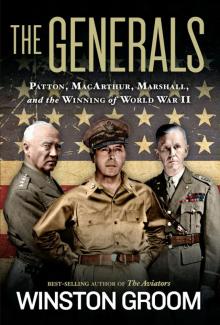 The Generals
The Generals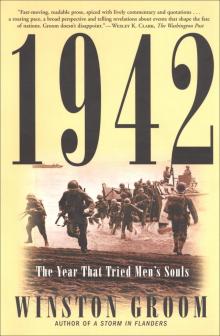 1942: The Year That Tried Men's Souls
1942: The Year That Tried Men's Souls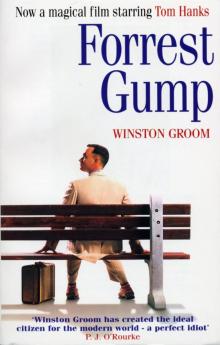 Forrest Gump
Forrest Gump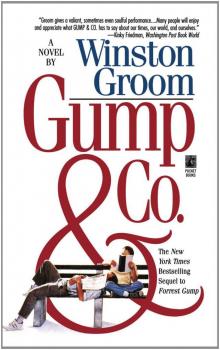 Gump and Co.
Gump and Co.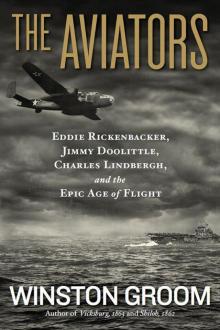 The Aviators
The Aviators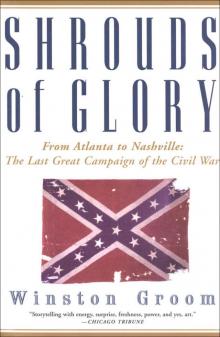 Shrouds of Glory
Shrouds of Glory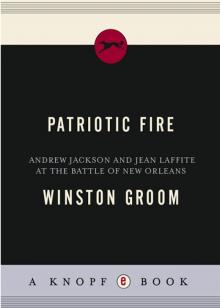 Patriotic Fire
Patriotic Fire Kearny's March
Kearny's March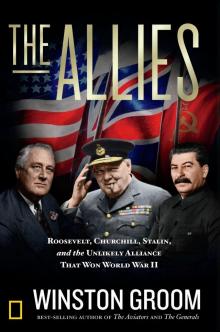 The Allies
The Allies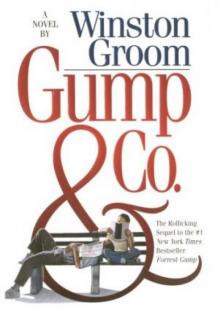 Gump & Company fg-2
Gump & Company fg-2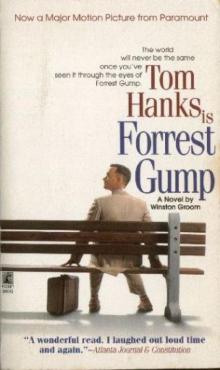 Forrest Gump fg-1
Forrest Gump fg-1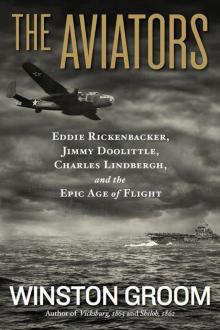 The Aviators: Eddie Rickenbacker, Jimmy Doolittle, Charles Lindbergh, and the Epic Age of Flight
The Aviators: Eddie Rickenbacker, Jimmy Doolittle, Charles Lindbergh, and the Epic Age of Flight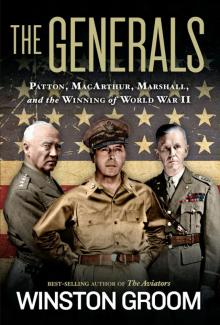 The Generals: Patton, MacArthur, Marshall, and the Winning of World War II
The Generals: Patton, MacArthur, Marshall, and the Winning of World War II